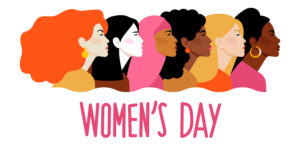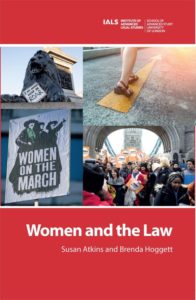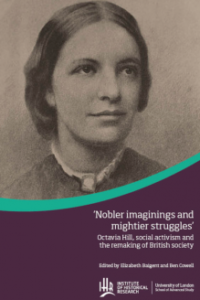International Women’s Day 2021
IALS Reading List
International Women’s Day (IWD) is a global day celebrating the social, economic, cultural and political achievements of women. IWD has occurred for well over a century with the first gathering held in 1911; see the IWD Timeline.
In order to celebrate IWD 2021, the IALS Digital Team have put together a reading list of Open Access materials which discuss the topic of gender.
All of these materials are free to read and the articles and books are free to download. Click on the title of the book or article to download the material.
From the BBC
Black Lives Matter: The three women who founded a global movement
Since the death of George Floyd and the wide-spread protests that followed his killing, Black Lives Matter has spread around the world, but it actually started seven years ago.
Patrisse Cullors, Alicia Garza and Opal Tometi are all featured on this year’s BBC 100 Women list and they came together to tell the story of the origins of the movement.
From the IALS OBserving Law Series
Women and the Law
Susan Atkins and Brenda Hoggett
Women and the Law by Susan Atkins and Brenda Hoggett (now Lady Hale, ex-President of the Supreme Court) was originally published in 1984. It was one of the very first modern books of its kind – providing pioneering legal scholarship on women’s treatment under law. It is a key and influential text.
The authors examine the origins of British law’s attitude to women, trace the development of the law and ways in which it reflects the influence of economic, social and political forces and the dominance of men. They illustrate the tendency, despite formal equality, for deep-rooted problems of encoded gender inequality to remain.
From the SAS Digital Humanities Library
Octavia Hill, social activism and the remaking of British society
Edited by Elizabeth Baigent, Ben Cowell
This volume reassesses the life and work of Octavia Hill, housing reformer, open space campaigner, co-founder of the National Trust, founder of the Army Cadet Force, and the first woman to be invited to sit on a royal commission. In her lifetime, if not a household name, Octavia Hill was widely regarded as an authority on a broad range of acknowledged social problems, particularly housing and poverty. Yet despite her early pre-eminence, subsequent attempts by family members to keep her memory alive, and the remarkable success of the institutions which she helped to found, Hill fell from public favour in the twentieth century.
From the IALS Blog
Women at the Bar: the Sex Disqualification (Removal) Act 1919 and the admission of women to the legal profession
Katie Broomfield
This blog post discusses the fact that is more than 100 years since women were first and finally admitted to the legal profession with the passing of the Sex Disqualification (Removal) Act 1919. The Act, which removed all legal barriers to women, including married women, working as lawyers was the result of a 40-year long campaign by women to be admitted to the legal profession.
From Amicus Curiae (official journal of the SALS and IALS)
Discrimination – Pakistan: the right to marry
Mr Justice Tassaduq Hussain Jilani
This article is based on an address given in 1999 to commemorate the 20th anniversary of the Convention on the Elimination of All Forms of Discrimination against Women (CFDAW) and discusses the socio-historic perspective and right of marriage in Islam.
Problems of interpretation by the European Court of Justice of community legislation on equal treatment for men and women
Judge Jean-Pierre Puissochet
This article provides an illustration, through concrete examples, of how the European Court of Justice proceeds on the basis of provisions dealing with equal treatment for men and women, and of the types of difficulties encountered in this process.
From mothering behind bars to parenting beyond barriers? The right to family life and the politics of imprisonment
Vanessa E Munro
In this paper the author looks at the access to and removal of prison mother and baby units. The article considers case law in the context of the prison administration of these units and suggests that more could be done to protect the Article 8 rights of both the imprisoned mother and her child.
From the IALS Student Law Review
Intimacy, Confidentiality, and Power: Kiss and Tell as a Feminist Critique of Privacy Law
Naomh Gibson
This article applies a feminist legal theory perspective to the current state of privacy law, contesting the perception of privacy as a universal, gender-neutral principle and submitting that privacy law is inconsistent and enshrines patriarchal value which perpetuate injustice against women. It proposes that ‘kiss and tell’ narratives offered a solution to this by subverting legal norms and deconstructing the contemporary judicial conception of ‘privacy’.
Gender neutral drafting: Gender equality or an unnecessary burden?
Constanza Toro
Gender neutral policies are almost unanimously defended nowadays. However, legal drafting is not always up to date regarding this challenge. This article examines the different reasons to defend a gender neutral drafting, highlighting that there are both justice reasons (inclusiveness) and methodological ones (clarity, precision and unambiguity) to embrace such policy.
From SAS Space (UoL online library for humanities research outputs)
Why the inflation in legislation on women’s bodies
Venessa McLean
This LLM dissertation argues that historical patriarchal theories have crept into the world’s legal systems to date, and as a result this has led to inflation in legislation upon women’s bodies. The author seeks to prove that patriarchal theories have become part of our social and legal institutions to date, resulting in unnecessary controls placed upon women’s bodies to the point that women’s attempt to assert autonomy over their own bodies have been criminalised or placed under heavy civil penalties.
Women in court: the property rights of brides, heiresses and widows in thirteenth-century England
Shen-Yen Lu
This PhD thesis targets women in court – those who were frequently recorded in legal documents managing or protecting their property rights. The main concern is the change and development of the legal status and property rights of women, namely hereditas (inheritance), maritagium (marriage portion) and dos (dower) from the end of the twelfth century to the thirteenth century in England, and how they strove for their rights in court. While the thirteenth century is significant in England for the crucial development of the common law, the evolving common law also enacted a few prominent pieces of legislation which had huge impacts for women’s property rights.
The rights of women in Islam: The question of ‘public’ and ‘private’ spheres for women’s rights and empowerment in Muslim societies
Saira Bano Orakzai
The question of women rights and empowerment in Islam is one of the most controversial issues within the Islamic schema of human rights. The rights of women as given in the Qura’n and the traditions of Prophet Muhammad were a revolutionary step in 7th century Arabia. However, the context driven reforms of rights of women in Islam is subject to many challenges in the traditional Muslim societies. This paper examines the question of women’s rights in Islam based on ‘public’ and ‘private’ sphere of life and its impact on the question of female empowerment.
Researching Women in Legal History: The case of Miss Bebb
Rosemary Auchmuty
This article is based upon a workshop jointly organised by the British Library, the Institute of Advanced Legal Studies and the Socio-Legal Studies Association.
The goal of the workshop was to think about how we write legal biography. Drawing on the research into the life of Gwyneth Bebb, who in 1913 challenged the Law Society of England and Wales for their refusal to admit women to the solicitors’ profession, the author focused on the range of sources one might use to explore the lives of women in law, about whom there might be a few public records but little else, and on the ways in which sources, even official ones, might be imaginatively used.
International Women’s Day in the Brazilian Countryside: New Forms of Political Protest and Resistance
Sônia Fátima Schwendler
This paper examines new forms of political protest and resistance carried out by Brazilian peasant women during the celebration of International Women’s Day. Since 2006, the Brazilian women of La Via Campesina (International Peasant Movement) have taken radical action in order to reclaim 8 March as an international day of struggle by women workers and to question the political, cultural and economic model of development. Their efforts to break the silence about the social and environmental impact of the expanding ‘green desert’ created by the eucalyptus monoculture of the big paper companies in Brazil provides a remarkable case of women’s subversive agency.
“Women, Life, Freedom”: The Struggle of Kurdish Women to Promote Human Rights
Sarah Siqueira de Miranda
The Kurdistan Worker’s Party (PKK), one of the most important secular socio-political movements of the Middle East, has addressed gender issues since its foundation in the late 1970s. However, the question of women’s freedom acquired a central position after the 2000s, when the PKK underwent a deep ideological and structural transformation. A foundational tenet is ‘democratic confederalism’, based on a democratic, ecological and gender-emancipatory system. For Abdullah Ocalan, the main leader of the PKK, democracy and freedom can only be achieved through the emancipation of women. Kurdish women have appropriated Ocalan’s ideas and to a considerable extent, succeeded in promoting the empowerment of women and advancement of gender equality in the Kurdish societies directly influenced by the PKK: the diaspora and territories in Turkey and Syria.
Women and the African National Congress, 1912-1943
Frene Ginwala
For the first 30 years of its existence the exclusion of women from full membership in the constitution of the SANNCIANC contrasted with the participation of women in the deliberations, decision-making and campaigns of the organization (though not in the leadership). This apparent contradiction arose from the actuality of African women’s involvement in resistance and the peculiar structure of the ANC, which allowed for ways in which women could participate.




